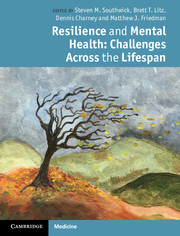Book contents
- Frontmatter
- Contents
- Contributors
- Preface
- Section 1 Pathways to resilience
- Neurobiology of resilience
- 2 Resilience in the face of stress: emotion regulation as a protective factor
- 3 Cognitive factors and resilience: how self-efficacy contributes to coping with adversities
- 4 Personality factors in resilience to traumatic stress
- 5 Social ties and resilience in chronic disease
- 6 Religious and spiritual factors in resilience
- Section 2 Resilience across the lifespan
- Section 3 Resilience in families, communities, and societies
- Section 4 Specific challenges
- Section 5 Training for resilience
- Index
- References
3 - Cognitive factors and resilience: how self-efficacy contributes to coping with adversities
from Section 1 - Pathways to resilience
Published online by Cambridge University Press: 07 September 2011
- Frontmatter
- Contents
- Contributors
- Preface
- Section 1 Pathways to resilience
- Neurobiology of resilience
- 2 Resilience in the face of stress: emotion regulation as a protective factor
- 3 Cognitive factors and resilience: how self-efficacy contributes to coping with adversities
- 4 Personality factors in resilience to traumatic stress
- 5 Social ties and resilience in chronic disease
- 6 Religious and spiritual factors in resilience
- Section 2 Resilience across the lifespan
- Section 3 Resilience in families, communities, and societies
- Section 4 Specific challenges
- Section 5 Training for resilience
- Index
- References
Summary
We are disturbed not by events, but by the views which we take of them
(Epictetus, stoic philosopher, c. 55–135)Introduction
Human ability to survive and to thrive in challenging or threatening situations has always fascinated people, inspiring artists and philosophers. People who proved their resilience, personal strengths, or moral virtues (as philosophers used to say) have been the focus of admiration and pride. They have been glorified as heroes in innumerate folktales and immortalized in countless works of art. The stoic philosophers, however, argued that ordinary people may face extraordinary circumstances and remain undisturbed by challenging situations. The quotation from Epictetus that opens this chapter introduces a major topic in this chapter: the role of cognitive processes in human resilience. Although there are many differences in cognitive approaches to understand resilience, all of them echo Epictetus’ aphorism that perception of reality and processing of vital information are critical components of coping with adversities.
Many definitions and measures capturing the concept of resilience have been proposed and are discussed in other chapters in this book, including physiological resistance (Selye, 1936), temperamental or personality predispositions (Kobasa, 1979; Scheier & Carver, 1985; Antonovsky, 1987; Strelau, 1998), trajectories of psychological distress outcomes (Bonanno, 2004), coping flexibility (Cheng, 2003), and self-perceptions of ability to manage one’s life (Davidson et al., 1982). The focus in this chapter relates to the role of cognitive determinants of successful adaptation.
- Type
- Chapter
- Information
- Resilience and Mental HealthChallenges Across the Lifespan, pp. 45 - 55Publisher: Cambridge University PressPrint publication year: 2011
References
- 33
- Cited by



